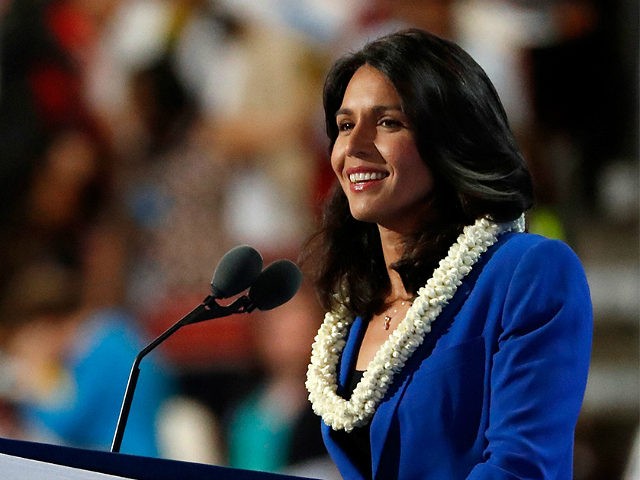An article appearing in the New Yorker explores the many sides of Tulsi Gabbard. A supporter of Bernie Sanders in the 2016 presidential election, an advocate for veterans, and vocal critic of America’s military interventionism, Kelefa Sanneh details the beliefs of Hawaii Democratic congresswoman:
When Tulsi Gabbard arrived at Lihue Airport, on the Hawaiian island of Kauai, she was greeted with a lei made of vibrant plumeria flowers, a small bottle of coconut water, a bagful of mangoes, and a profusion of alerts on her phone. It was Memorial Day, and Gabbard had agreed to speak at a ceremony honoring veterans at a local military cemetery. Many of the people there would be her brothers and sisters in arms: Gabbard has served, since 2003, in the Army National Guard, in which capacity she completed a tour of duty in Iraq. And almost all the people there would be her constituents—in 2012, Gabbard was elected to the United States Congress, representing Hawaii’s Second District, which includes all of the Hawaiian archipelago outside Honolulu, the capital. Gabbard found her local field representative, Kaulana Finn, gave her a hug, and climbed into her car. “As soon as I land here, I get text messages from people saying, ‘I heard you’re on Kauai—what are you doing?’ ” Gabbard said, grinning. “I don’t think it’s possible to do anything here without everybody knowing about it.”
All politicians must act as if they enjoy patriotic ceremonies, but Gabbard is one of the few who seem as if they were not acting. She is thirty-six, and has a knack for projecting both youthful joy and grownup gravitas. Her political profile is similarly hybrid. She is a fervent Bernie Sanders supporter with equally fervent bipartisan tendencies—known, roughly equally, for her concern for the treatment of veterans and her opposition to U.S. intervention abroad. She is also a vegetarian and a practicing Hindu—the first Hindu ever elected to Congress—as well as a lifelong surfer and an accomplished athlete. On Capitol Hill, she is often regarded as a glamorous anomaly: a Hawaiian action figure, fabulously out of place among her besuited colleagues. “She’s almost straight from central casting, if you need a heroine,” Van Jones, the progressive activist, says. Trey Gowdy, the South Carolina Republican, is one of her closest friends in Congress. He first spied her on the House floor, sitting on the Republican side of the aisle. “This sounds terrible to say, but it’s also true—you know, she’s cute,” he says. “So if you’re sitting on that side, and it’s a boring speech, you’re going to notice.” The night after Gabbard was elected, Rachel Maddow made a prediction on MSNBC: “She is on the fast track to being very famous.”
On the way to the ceremony, Finn stopped at her house so that Gabbard could change into her military uniform, which she had brought along, in a dry cleaner’s bag, as carry-on luggage. Finn gave her a motherly appraisal. “Do you have your headpiece?” she asked, then corrected herself. “Pardon me. I don’t know the proper terminology for military gear.”
Gabbard chuckled and offered the right word: “Cover.” She had hers, and soon she was standing at solemn attention at the Kauai Veterans Cemetery, where the graves were sprigged with American flags and a local Junior R.O.T.C. troop was lining the entrance. It was a hot but breezy day, with birds chirping and a few wild chickens strutting among the tombstones. There was a podium flanked by wreaths in front of a tiled mural depicting a mournful beach scene: a line of battlefield crosses, two empty boots, an upright rifle, pastel clouds in the distance.
You can read the rest of the story here.

COMMENTS
Please let us know if you're having issues with commenting.